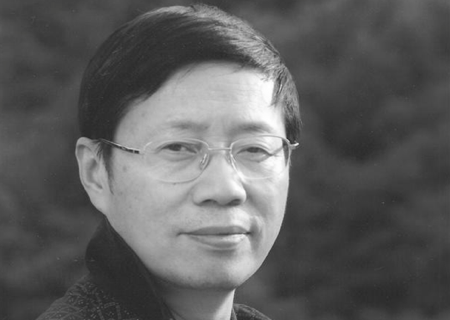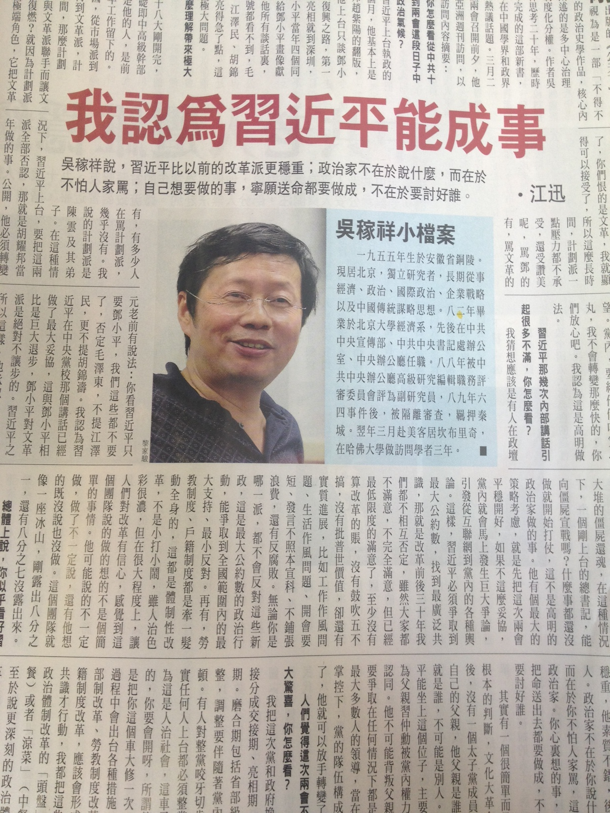Earlier this year, Wu Jiaxiang (吴稼祥), a noted political theorist and former CMP fellow, released his master work of Chinese political theory. The book, Gong Tian Xia (公天下), was reportedly an instant hit among Party officials in Beijing.
Gong Tian Xia explores 4,000 years of Chinese political history — a massive undertaking Wu says was a twenty-year labor of love — and derives (according to one summary) a “democratic macro-theory” based on polycentric governance (多中心治理) that Wu then applies to China’s present and future politics. (For a better introduction than that, readers will have to turn to the book itself, which we’ve only had time to glance at. You can also listen to Wu Jiaxiang talk about the book here.)

Wu Jiaxiang, it should also be noted, is perhaps the most prominent intellectual heavyweight to have maintained in recent months the faith that Xi Jinping is indeed a reformer, and that bolder (but calculated) moves are in the offing once China gets through the National People’s Congress now underway in Beijing.
Wu is interviewed for the most recent edition of Hong Kong’s Yazhou Zhoukan, and he remains solidly among the faithful. The following is a portion of his interview, which comes under the headline: “I think Xi Jinping can deliver” (我认为习近平能成事).
YZZK: How do you view the political climate inside the Chinese Communist Party between the 18th National Congress and the “two meetings” [of the NPC and CPPCC]?
Wu Jiaxiang: During his first month after taking the stage [as General Secretary of the CCP], he basically was a refurbished version of Hu Yaobang (胡耀邦) and Zhao Ziyang (赵紫阳). For example, he would keep his talk onstage to Deng Xiaoping, and he would talk about the road to [national] rejuvenation. His first trip out was to Shenzhen, and he invited along four people who had accompanied Deng Xiaoping [on his “southern tour” in 1992]. He laid flowers before the image of Deng Xiaoping. In all of his speeches three important political symbols were missing — Mao Zedong, Jiang Zemin and Hu Jintao. He was perhaps too anxious to show himself [on the Shenzhen tour], and this resulted in some major problems.
YZZK: What do you mean by major problems?
Wu Jiaxiang: Immediately after the 18th National Congress, [Xi Jinping] did not have everyone — [Party] cadres at the middle, upper and foundational levels — in his corner. He was still under the shadow of the previous ten-year administration. In present-day China, we have at one [political] extreme what we can call the market faction (市场派) [or liberal pro-reformers]. At the other extreme we have the Cultural Revolution faction (文革派) [or “leftists”]. In the middle we have the [state] planning faction (计划派). [NOTE: Chen Yuan, who Wu mentions in a moment as a member of this faction, is generally regarded as part of the “princeling” faction, or powerful interest group comprising the sons and daughters of former top Party leaders. Here, what we have clumsily rendered the “state planning faction” should refer to those in favor of a strong role for state-run enterprises, many of which are controlled by vested interests like the “princelings.”]
Well, why was it that the planning faction linked hands with the Cultural Revolution faction, allowing the dying embers of the Cultural Revolution faction to be fanned again to life? It’s because the planning faction did not want to appear extreme [in their agendas]. By stirring up the Cultural Revolution faction [as an opposition on the extreme left] they could appear more moderate [relative to the market faction]. It’s the Cultural Revolution that you really despise, they could say — but me you can deal with. So for some time the planning faction faced no pressure at all. They were even praised. There was some criticism of Deng [from the left]. There was criticism of the Cultural Revolution [from the right]. But how much criticism was there of the planning faction? None at all, perhaps. When I talk about the planning faction, I’m talking about Chen Yun (陈云) and his son [Chen Yuan]. Given this environment, as Xi Jinping comes to power he wants to totally deny these two factions — that’s exactly what Hu Yaobang did back in the day. Openly, he must shift the larger political climate, otherwise everyone will feel disappointment. Within the Party, he must calm everyone’s nerves, suggesting he won’t push changes too rapidly, that everyone can just relax. I think this is a wise approach.
YZZK: Those internal speeches by Xi Jinping have created a lot of dissatisfaction. How do view this?
Wu Jiaxiang: My guess is that this is about [addressing] a sense among some prominent old politicians that says basically, look, this Xi Jinping cares only about Deng Xiaoping, he has no use for us — he denies Mao Zedong, he doesn’t mention Jiang Zemin, he talks even less about Hu Jintao. I believe Xi Jinping’s speech at the Central Party School already marked a major compromise, a huge back-step in comparison to how much Deng Xiaoping was willing to give. Deng Xiaoping essentially yielded nothing to the Cultural Revolution faction. Xi Jinping made this [compromise] because he recognised the fact that the Cultural Revolution faction had already made a comeback, that, moreover, this comeback was quite substantial, like a bunch of walking dead if you will. Faced with this situation, how could a General Secretary who has just come to power declare war against these monsters?
A wise politician won’t declare war before they’ve even managed to accomplish something. [Xi Jinping] has a major strategic consideration, and that is to first ensure that this year’s meetings of the National People’s Congress and the Chinese People’s Political Consultative Conference proceeed smoothly. If he didn’t compromise, this would instantly drive a major wedge in the Party. The ripples would run across the internet and through the Party ranks. So Xi Jinping must seek the greatest common denominator. He must find broad consensus — and that comes on the issue of the past thirty years of reform, which no side rejects outright. Everyone may be unsatisfied, or not entirely satisfied, but we can say we all have a minimum level of satisfaction, that no one wants to reverse reforms, and no one is calling for the Five Don’ts (五不搞). [NOTE: The “Five Don’ts” represent a more conservative position within the Party in opposition to deeper political reform. They are opposition to 1) a multi-party system , 2) a diversity of guiding political ideologies , 3) separation of powers, 4) federalism and 5) privatization.] There is no criticism [vocally within the Party] of universal values (普世价值). And there is substantial progress, for example on the question of work style, on the question of lifestyle [among officials], on the need to make meetings shorter, on not simply following the [Party] script, on not being extravagant [for official events], and on the anti-corruption drive. No one is going to oppose these new policies, regardless of which faction they belong to. This is a political movement of the greatest common denominator, and it can garner the broadest possible support across the country — and of course the lowest level of opposition.
Besides this, there is [talk, of] the system of re-education through labor, and the household register system, and these are both institutional reforms that would ripple through the entire system. They are not at all insignificant. There may still be a strong autocratic flavor (人治色彩) [to many of these policies], but in a larger sense they give people confidence in reform, and make people feel that this crop [of leaders] is ready to act as well as think and talk. It might be that he talks about some things he won’t necessarily do. He may also do things he doesn’t necessarily talk about. There may also be things he’s thinking about that he can neither say nor do. This administration is like an iceberg, and right now we see maybe one-eighth. There are still seven-eighths we haven’t seen yet.
YZZK: So all in all, you have a favorable view of Xi Jinping’s leadership?
Wu Jiaxiang: I certainly believe that he can deliver. I would say he’s more steady than pro-reform leaders we have had in the past (以前的改革派领导人). His approach and character are not bad — his strategy is one of besting his opponents after they strike (后发制人). A politician’s strength comes not in what they say, but in having the courage to face the criticisms of others — that’s what makes a politician. It’s about having the determination to accomplish the ideas in your heart at all costs, not about ingratiating yourself with others.
Actually, there is another simple way of looking at this. After the Cultural Revolution, not one member of the princelings betrayed their own father. Whoever their fathers were, they were, and they were nothing else besides. Xi Jinping can sit where he is now chiefly because his father, Xi Zhongxun (习仲勳), was endorsed by powerful people within the Party. He would never betray his father [and his father’s ideas]. He will strive in all situations to be the leader for the greatest common denominator within the Party. Once the configuration of the Party ranks changes in his grip, he will be able to have a free hand.























